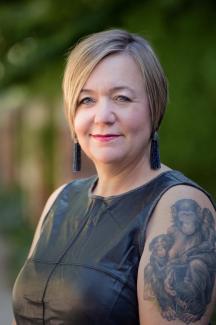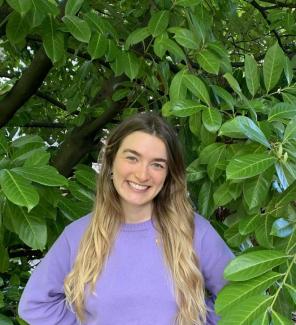What is it?
We’re taking a field trip away from our regular Women’s Health Interrupted content to bring you a special mini series! Hosted by Dr. Marina Adshade and Damara Featherstone, this miniseries aims to find out what every women’s health researcher should know about socioeconomic status. Socioeconomic status is a combination of economic factors—like income, education and occupation—and social factors including gender, race, country of origin, and much more. By talking with experts in the arts and humanities, we will get to the bottom of this question, and show how important it is that we all work together, to improve women’s health.
Join us every second Wednesday of the month for 5 information packed episodes!
Released Episodes
Episode 5: "How Women’s Socio-Economic Status Correlates with Intimate Partner Violence"
“If women are better off economically in society they essentially have the ability to negotiate in the household better because they can actually leave if things get really bad.” - Dr. Siwan Anderson
In the final episode of our mini series, Dr. Siwan Anderson talks about how women’s socio-economic status strongly correlates with their health outcomes, especially Intimate Partner Violence (IPV). Dr. Anderson also discusses some interesting findings in her research on how women are less likely to suffer abuse if they have access to a share of the household. Her current research looks at the women’s relationships with power in the household and how religious and cultural norms come into play in this context.
Resources mentioned in the episode:
- Intimate Partner Violence and Female Property Rights
- Missing Unmarried Women
- Unbundling Female Empowerment
- How Economics can Contribute to Evolutionary Perspectives on the Family
- Property Rights over Marital Transfers
Guest Biography:
Dr. Siwan Anderson is a professor in the Vancouver School of Economics at the University of British Columbia. Her research area is applied development economics and much of her work centers on women in developing countries. She has worked on determinants of female autonomy, missing women, and marriage markets in various contexts. Dr. Anderson is a Research Fellow at the Bureau for Research and Economic Analysis of Development (BREAD) and the Centre for Economic Policy Research (CEPR), and a Faculty Associate at the Center for Effective Global Action (CEGA) at the University of California, Berkeley. She is also a member of the Institutions, Organizations, and Growth research group of the Canadian Institute for Advanced Research. Dr. Anderson is the first woman to receive the John Rae Prize, awarded by the Canadian Economic Association.
Episode 4: "Social and Behavioural Epidemiology"
“When you have a majoritarian or democratic approach to shaping public policy, that often means that marginalized people are going to suffer from the biases that the larger population holds.” - Dr. Kiffer Card
In the fourth episode of our mini series, we talk to Dr. Kiffer Card about social and behavioural determinants of health and how healthcare researchers can improve the study of these determinants. Dr. Card discusses the historical failures of governments and researchers to provide adequate care for marginalized communities and how his work aims to begin filling those gaps.
Resources mentioned in the episode:
- What public health interventions do people in Canada prefer to fund? A discrete choice experiment
- DBSS S2E10: Stay Social, Stay Healthy - Kiffer Card
- The Canadian Social Connection Survey Results Webinar
Guest Biography:
Dr. Kiffer Card is the Scientific Director of the Institute for Social Connection and a Professor with the Faculty of Health Sciences at Simon Fraser University. His research focuses on socio-ecological responses to complex co-occurring health inequities with an emphasis on public health crises driven by social and behavioral determinants.
Episode 3: "How Migration Status Impacts Health and Healthcare of Refugees"
“People do their best to maintain their emotional wellbeing. ... They spend time with their friends, or they create mutual collective support mechanisms to cope with these feelings of exhaustion, boredom, insecurity and uncertainty, and they try to maintain their hope for a better future, but it’s not always easy to do so.” - Dr. Elif Sari
In the third episode of our mini series, we talk to Dr. Elif Sari about how the notion of “becoming sick” is related to people’s migration experiences, especially those who are part of the 2S/LGBTQIA+ community. Dr. Sari discusses how this notion is rooted in the idea of harsh working environments and discriminatory practices of healthcare. She also addressed how both of these factors contribute to the emotional and physical wellbeing of these people.
Resources mentioned in the episode:
- Unsafe Present, Uncertain Future: LGBTI Asylum in Turkey
- No Safe Refuge: Asylum-Seekers and Refugees Denied Effective Protection in Turkey
- Governing through Uncertainty: Experiences of Being a Refugee in Turkey as a Country for Temporary Asylum
- Working Life Experiences of Iranian LGBTI Migrant Workers in Denizli Province in Terms of Occupational Health and Safety.
- Unsafe Haven: The Security Challenges Facing Lesbian, Gay, Bisexual and Transgender Asylum Seekers and Refugees in Turkey
- Waiting to be ‘Safe and Sound’: Turkey as LGBTI Refugees’ Way Station
Guest Biography:
Dr. Elif Sari is a queer feminist anthropologist, a new faculty member in the UBC Department of Anthropology, and an uninvited immigrant settler on the unceded Coast Salish territories of the xʷməθkʷəy̓əm (Musqueam) First Nation. She completed her Ph.D. (2021) in anthropology at Cornell University with a concentration in feminist, gender, and sexuality studies. After graduate school, Dr. Sari spent one year at the University of Toronto, where she had a chance to work in the Queer and Trans Research Lab as the Martha LA McCain postdoctoral fellow. Currently, she is working on her first book manuscript, which is an engaged ethnography of queer and trans asylum from the Middle East to North America. She is also excited to start two new research projects, one focusing on private refugee sponsorship in Canada and one exploring the connections between migration, sexuality, and art (particularly drag).
Episode 2: "The Impacts of Gender and Intersectionality on Health Policy”
“Power is impacting every level of this ... from your interactions at a facility, all the way to decisions that are being taken in state capitals and national capitals.” - Dr. Veena Sriram
In the second episode of our mini series, we talk to Dr. Veena Sriram about the role of power structures, such as gender, in global healthcare systems and policies. She highlights the importance of interdisciplinary study between public health and social sciences to better critically analyze healthcare systems.
Resources mentioned in the episode:
- Heroes on Strike: Trends in Global Health Workers Protests during COVID-19
- Recontextualizing Physician Associations: Revisting Context, Scope and Methodology
- 10 Best Resources on Power in Health Policy and Systems in Middle and Low-income Countries
- Delivered by Women, Led by Men: A Gender and Equity Analysis of the Global Health and Social Force
- On Racism: A New Standard for Publishing on Racial Health Inequities
Guest Biography:
Veena Sriram is an Assistant Professor with a joint appointment in the School of Public Policy and Global Affairs (SPPGA) and the School of Population and Public Health (SPPH) at the University of British Columbia. Her research sits at the intersection of global health, social science and public policy, and her interests are in understanding power and politics in health policy processes in low- and middle-income countries. She draws upon theory and methodologies from the social sciences in conducting her research, and has a particular focus on qualitative approaches. Dr. Sriram has conducted extensive research at the national and state level in India, exploring a range of health policy and system questions, including medical specialization, health workforce policy development, the functioning of national health authorities and emergency care systems. She has also contributed to expanding the application of theory and concepts to study power in health policy and systems research.
Episode 1: “What Does Justice Mean for Women who Seek Reparations?”
“What is it that needs to be done for you to feel that your life has been repaired or for you to feel that that justice has happened? I just need these [bullets] to be taken out of my body” - Dr. Ketty Anyeko
In the first episode of our mini-series, we talk to Dr. Ketty Anyeko about how economic barriers prevent many women from seeking justice and reparations in their lives. She discusses storytelling as a powerful tool for many women who have experienced sexual violence in Northern Uganda and the importance of listening to the community.
Resources mentioned in the episode:
- Storytelling and Peacebuilding: Lessons from Northern Uganda
- ‘The Cooling of Hearts’: Community Truth-Telling in Northern Uganda
- Child Tracing: Locating the Paternal Homes of “Children Born of War”
- Improving Accountability for Conflict-Related Sexual Violence in Africa
Guest Biography:
Dr. Ketty Anyeko is a Postdoctoral Research Fellow with the Research Network on Women, Peace and Security (WPS) at the School of Public Policy and Global Affairs, University of British Columbia (UBC), and the School for International Studies, at Simon Fraser University. She holds a Ph.D. in Interdisciplinary Studies from UBC and an MA in Peace Studies from Notre Dame University (USA). Dr. Anyeko’s research is centered on women’s senses of justice and reparations after wartime sexual violence in Northern Uganda. With nearly two decades’ experience in women, peace, and justice, and gender programme planning and implementation, Dr. Anyeko applies her expertise to her scholarly work around the lack of understanding of justice and reparations for the women she has worked with.
About the hosts
Dr. Marina Adshade
FIELD TRIP MINI-SERIES PODCAST CO-HOST
UNIVERSITY OF BRITISH COLUMBIA
Dr. Marina Adshade is a faculty member at the Vancouver School of Economics at the University of British Columbia. She is one of Canada’s foremost economics experts on the role of women in society and a major advocate for inclusive cultural reform, with the goal of increasing safety, competitiveness, and leadership.
Her unique approach to research applies a mix of economic, sociological, biological, and psychological theories and evidence to a wide range of social issues. She is a sought-after speaker, writer, and social commentator and has published over sixty opinion pieces and feature articles in the Wall Street Journal, Sunday Times (UK), Daily Mail (UK), Globe and Mail, Time Magazine, Psychology Today, the Daily Beast, and Buzzfeed.

Damara Featherstone
FIELD TRIP MINI-SERIES PODCAST CO-HOST
UNIVERSITY OF BRITISH COLUMBIA
Damara Featherstone (she/her) holds a B.Sc in Global Health, Nutrition, and Sustainable Food Systems from the University of British Columbia. Damara is the podcast coordinator and co-host of Women’s Health Interrupted: Field Trip. In this role, she co-hosts with Dr. Marina Adshade as well as researches, develops, and edits the mini series. Damara joined this project as she is passionate about knowledge translation and disseminating scientific knowledge beyond academia in an accessible way.

Listen/Subscribe:
Season 1 is available now on all major platforms! While waiting for season 2 check out our miniseries "Field Trip" starting September 14th!






